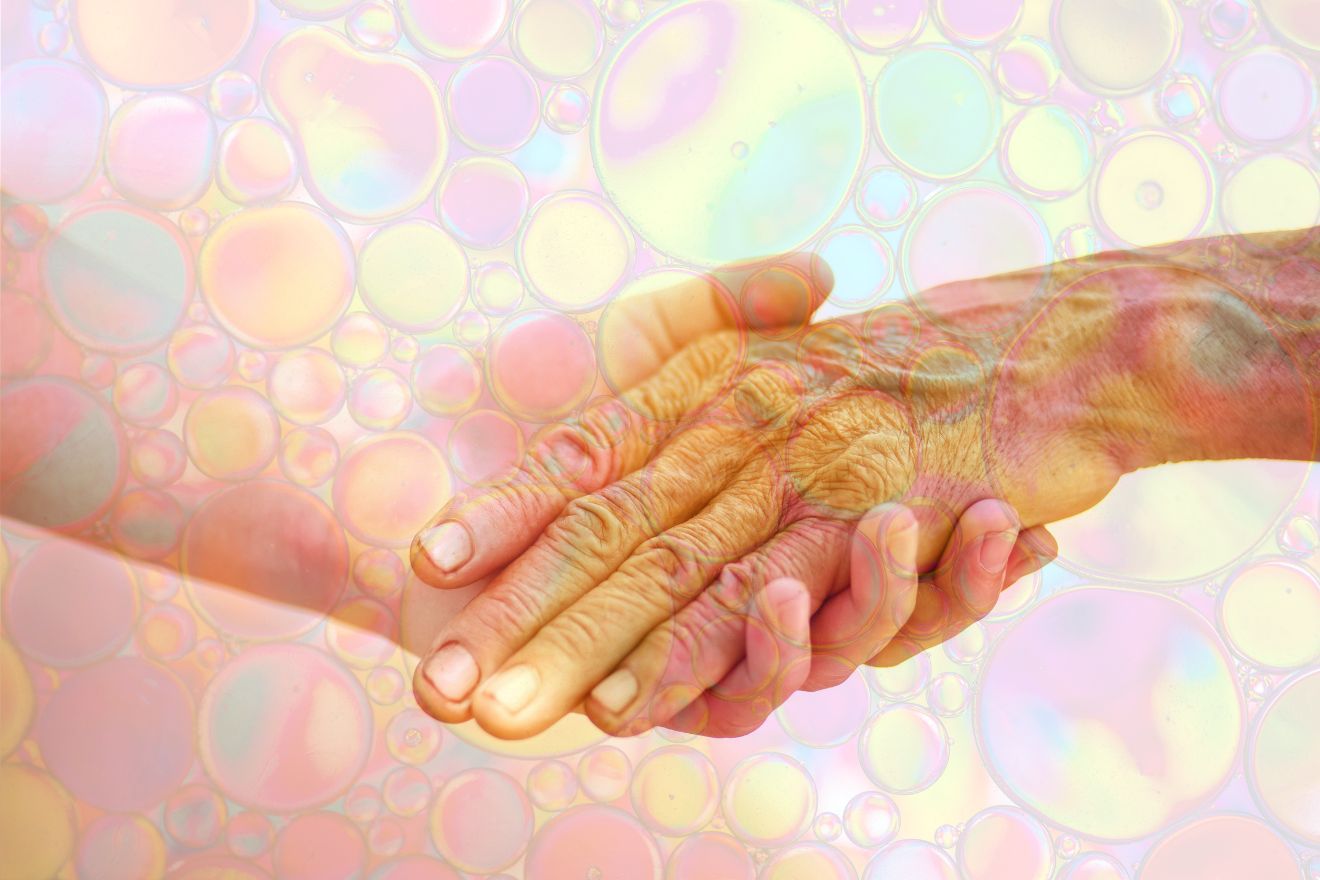We are born into the world with an understanding of the impermanence of human existence. Death is inevitable. Although most of us don’t wake up in the morning thinking about when or how we will die, some do.
Those who suffer from life-threatening conditions, or terminal illnesses and/or are in palliative care have to come face to face with the end of their existence. It can trigger anxiety, depression, feelings of disappointment, extreme fear, powerlessness and deep sadness. Memories may resurface as regrets, a sense of guilt or shame. Worries about what will happen to loved ones may overwhelm the mind.
What if there was a way to manage the process of dying so that those who are awaiting their last breath can embrace death with more peace, acceptance and less fear and helplessness?
Follow your Curiosity
Sign up to receive our free psychedelic courses, 45 page eBook, and special offers delivered to your inbox.What is Palliative Care?
Palliative care is the care provided to a person who has a life-threatening condition or serious illness so they can remain comfortable as they approach the end of their life. It is also referred to as end-of-life care.
The purpose of palliative care is to help improve an individual’s quality of life, manage pain, reduce physical symptoms such as nausea and difficulty breathing and relieve psychological symptoms such as anxiety and depression. It provides emotional, spiritual, psychological and social support to the person so they can have a more dignified and peaceful death.
History Of Psychedelics in Palliative Care
In Indigenous populations, psychedelics have been used for spiritual and healing purposes for thousands of years. However, the use of them in Western cultures is considered a relatively new idea1,3.
In the 1950s, psychedelic researchers started studying the different ways LSD and mescaline can be applied in a healthcare context and it became evident that end-of-life care was a potential focus1.
Specifically, researchers in Canada were the first to advocate for the use of these drugs to treat mental health conditions. Psychiatrist Humphry Osmond and his friend, writer and philosopher Aldous Huxley shared a similar view and an interest in this field2. During the 1950s, the two men corresponded via letters, detailing their thoughts on the effect of psychoactive substances on the mind, perception, empathy and possible therapies.
Osmond was studying the effects of LSD on his patients at the Weyburn Mental Hospital in Weyburn, Saskatchewan. Huxley experimented on himself. During his wife’s battle with cancer and eventual death, Huxley wrote to Osmond about how the use of LSD made her transition into death more peaceful and easy. After witnessing his wife’s experience, he requested a similar approach to his death which occurred in 1963.
However, before the research could expand and further studies could be conducted on the application of psychoactive substances in dying care, psychedelics were deemed illegal due to political reasons. Much of the initial discussions and research disappeared shortly after the 1970s1.
The exchange of letters between the two friends provides the documentation and gives us an opportunity to understand the infancy of psychedelic-assisted therapies in palliative care. In recent years, there has been a resurgence of interest and focus on psychedelic research and therapy2.
The use, possession or sale of psychedelics is considered prohibited in Canada unless authorized for clinical trial or research purposes. However, in August 2020, four terminally ill Canadian patients were given special approval to use psilocybin to relieve their end-of-life anxiety symptoms. TheraPsil, a Canadian non-profit coalition spearheaded these efforts through over 100 days of advocacy.
This is the first time in Canadian history that a legal exemption has been provided to patients to receive psychedelics for treatment based on compassionate grounds.
In the US, a few states are on the path to legalizing the use of psychedelic substances including Oregon and California7.
Effect Of Psychedelics on Palliative Care
There have been several studies that looked at the effect of psychedelics on end-of-life care and on patients with life-threatening conditions.
A randomized controlled trial looked at the experiences of psilocybin-assisted psychotherapy for the treatment of cancer-related distress8. Interviews were conducted with 13 cancer patients who had clinically elevated anxiety. Under close supervision, each participant was given a single dose of psilocybin. The interviews were transcribed and analyzed to identify themes. The trial revealed that the psilocybin therapy helped participants reconcile with death, acknowledge cancer’s place in their life, reclaim their presence, reconnect to life, and gave greater confidence in the event of cancer recurrence.
A retrospective medical record review looked at using ketamine to treat depression in hospice care patients4. It showed that ketamine was significantly associated with positive results in patients through the first week after dosing. The review concluded that ketamine may be a safe and effective depression treatment for patients in hospice care.
Lastly, a systematic review published in 2022 did a comprehensive analysis of studies on psychedelic treatment in terminally ill patients for depression, existential distress, and anxiety6. After screening 1850 records, 33 articles were included in its review. The results indicate that ketamine, LSD, MDMA and psilocybin have beneficial effects on quality of life, existential and spiritual well-being, acceptance, and decreased anxiety and depression.
A Promising Future
The US criminalization of psychedelics in the 1970s created a stigma in the public and medical community regarding their use. Due to a lack of psychedelic research, education and knowledge translation, healthcare providers are reluctant to adopt these therapies and explore their applications in end-of-life care. However, there has been a movement and shift in perspectives in recent times.
A 2021 study examined the attitudes of palliative care providers toward psychedelic-assisted therapies in treating existential distress5. Providers who were interviewed included nurses, physicians, social workers, chaplains and a psychologist. Their responses showed that current approaches in the treatment of existential distress are insufficient and psychedelic-assisted therapies are promising. However, more robust evidence, additional clinical studies and education outreach are needed to address treatment targets, safety concerns and risks.
Therefore, the treatments in palliative care that are currently available do not address some of the mental, emotional and spiritual challenges patients face at the end of their lives. Although further research is required and a cultural shift needs to occur, the potential impact of psychedelics may offer the right support and hope for palliative care providers and make death a little less terrifying and distressing for those who are inches away9.
References
- Dyck E. Psychedelics and dying care: a historical look at the relationship between psychedelics and palliative care. J Psychoactive Drugs. 2019;51(2):102–107. https://pubmed.ncbi.nlm.nih.gov/30821651/
- Dyck E, Farrell P. Psychedelics and psychotherapy in Canada: Humphry Osmond and Aldous Huxley. Hist Psychol. 2018;21(3):240–253. https://pubmed.ncbi.nlm.nih.gov/30138029/
- George JR, Michaels TI, Sevelius J, Williams MT. The psychedelic renaissance and the limitations of a White-dominant medical framework: A call for indigenous and ethnic minority inclusion. Journal of Psychedelic Studies. 2020;4(1):4–15. doi:10.1556/2054.2019.015 https://akjournals.com/view/journals/2054/4/1/article-p4.xml
- Iglewicz A, Morrison K, Nelesen RA, et al. Ketamine for the treatment of depression in patients receiving hospice care: a retrospective medical record review of thirty-one cases. Psychosomatics. 2015;56(4):329–337. https://pubmed.ncbi.nlm.nih.gov/25616995/
- Niles H, Fogg C, Kelmendi B, Lazenby M. Palliative care provider attitudes toward existential distress and treatment with psychedelic-assisted therapies. BMC Palliat Care. 2021;20(1):191. https://pubmed.ncbi.nlm.nih.gov/34930220/
- Schimmel N, Breeksema JJ, Smith-Apeldoorn SY, Veraart J, van den Brink W, Schoevers RA. Psychedelics for the treatment of depression, anxiety, and existential distress in patients with a terminal illness: a systematic review. Psychopharmacology (Berl). 2022;239(1):15–33. https://pubmed.ncbi.nlm.nih.gov/34812901/
- Smith WR, Appelbaum PS. Two models of legalization of psychedelic substances. JAMA. 2021;326(8):697–698. https://www.ncbi.nlm.nih.gov/pmc/articles/PMC8753745/
- Swift TC, Belser AB, Agin-Liebes G, et al. Cancer at the dinner table: experiences of psilocybin-assisted psychotherapy for the treatment of cancer-related distress. Journal of Humanistic Psychology. 2017;57(5):488–519. https://journals.sagepub.com/doi/full/10.1177/0022167817715966
- Yaden DB, Nayak SM, Gukasyan N, Anderson BT, Griffiths RR. The potential of psychedelics for end of life and palliative care. Curr Top Behav Neurosci. 2022;56:169–184. https://pubmed.ncbi.nlm.nih.gov/34958455/








